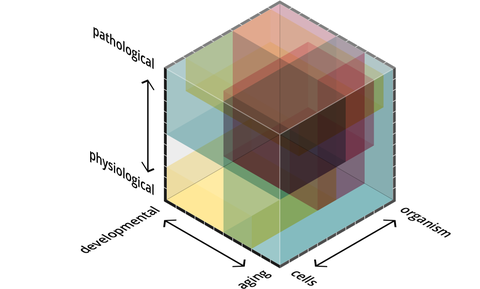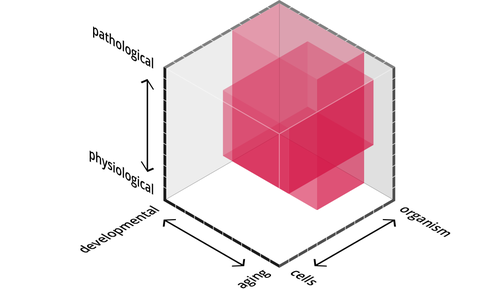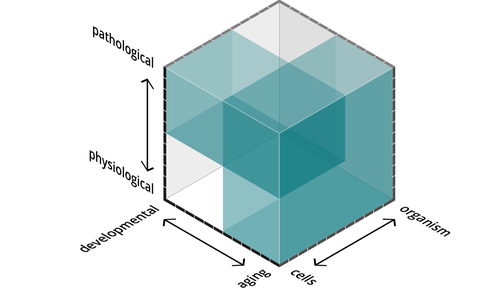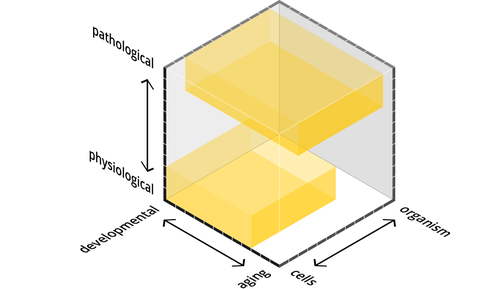Interdisziplinäre Zusammenarbeit mit unseren Partnern
Inhaltsverzeichnis
Die Medizinische Fakultät, das Deutsche Zentrum für Neurodegenerative Erkrankungen (DZNE) und das Zentrum für Regenerative Therapien Dresden (CRTD) bilden eine sich hervorragend ergänzende Partnerschaft in der neurowissenschaftlichen Forschung zu neurodegenerativen Erkrankungen. Gemeinsam befassen sie sich mit Fragen, die sich anhand eines Würfelmodells1 verdeutlichen lassen, und bringen dabei sowohl ihr einzigartiges als auch sich überschneidendes Fachwissen ein (siehe rechts), das durch die Farben rot (Medizinische Fakultät), blau (DZNE) und gelb (CRTD) abgebildet wird. Einzelheiten zu den Kernkompetenzen der einzelnen Institutionen sind nachstehend aufgeführt.
Die Medizinische Fakultät widmet sich dem Verständnis der Variabilität neurologischer und psychischer Störungen, und integriert dabei Neurowissenschaften, Psychologie, Psychiatrie und digitale Gesundheit, um innovative Lösungen zu entwickeln. Das DZNE bringt Fachwissen über das gesamte Spektrum neurodegenerativer Erkrankungen ein, wobei sich der Dresdner Standort auf Neuroplastizität, zellbasierte Modelle und adulte Neurogenese spezialisiert und grundlegende Erkenntnisse liefert. Das CRTD treibt die Forschung im Bereich der Zell- und Geweberegeneration voran und konzentriert sich dabei auf die Proliferation und Differenzierung neuronaler Stammzellen, um den Verlust von Nervenzellen bei Krankheiten wie Parkinson, ALS und Rückenmarksverletzungen zu verhindern oder gar umzukehren. Gemeinsam nutzen diese Einrichtungen ihre Stärken, um bahnbrechende Entdeckungen voranzutreiben und die Grundlagenforschung in transformative klinische Anwendungen zu übertragen.
Medizinische Fakultät Carl Gustav Carus (MFD)
Die Medizinische Fakultät forscht auf dem Gebiet der Neurowissenschaften und der psychischen Störungen und deckt damit ein breites Spektrum von der Zelle bis zum Organismus ab. Das Ziel besteht darin, die Ursachen für die Schwankungen und Variabilität der Anzeichen und Symptome zu verstehen, die bei den meisten neurologischen und psychischen Erkrankungen auftreten. Durch die Synthese modernster Methoden u.a. aus den Neurowissenschaften, der Psychologie, der Psychiatrie und der digitalen Gesundheit erweitern wir die Tiefe und Reichweite unserer Forschung erheblich und treiben die Entwicklung neuartiger Lösungen für komplexe neurologische Erkrankungen und psychische Störungen voran. Weitere Informationen finden Sie auf der Webseite der Medizinischen Fakultät Carl Gustav Carus.
Kontakt: Prof. Christian Beste
Deutsches Zentrum für Neurodegenerative Erkrankungen (DZNE)
Das Deutsche Zentrum für Neurodegenerative Erkrankungen (DZNE) ist ein wichtiges Forschungszentrum und Teil der Helmholtz-Gemeinschaft mit Hauptsitz in Bonn, das an zehn Standorten in Deutschland tätig ist. Es deckt das gesamte Spektrum der Forschung zu neurodegenerativen Erkrankungen wie Alzheimer-Demenz, Parkinson oder Amyotrophe Lateralsklerose (ALS) ab, von der Grundlagenforschung bis hin zur klinischen Forschung. Das DZNE ist eine der wissenschaftlichen Spitzeneinrichtungen auf diesem Gebiet weltweit. Der Standort Dresden befasst sich mit den neurobiologischen Grundlagen der Prävention, Mechanismen der Plastizität sowie zellbasierten Krankheitsmodellen. Dazu gehört auch grundlegende Forschung zur Neurogenese bei Erwachsenen, d.h. die Bildung neuer Nervenzellen im erwachsenen und alternden Gehirn. Weitere Informationen finden Sie auf der Webseite des DZNE.
Kontakt: Prof. Gerd Kempermann
Center for Regenerative Therapies Dresden (CRTD)
Das Zentrum für Regenerative Therapien Dresden (CRTD) befasst sich mit der Erforschung von Prinzipien der Zell- und Geweberegeneration und deren Nutzung zur Diagnose, Behandlung und Heilung von Krankheiten. Unsere Vision für den Forschungsbereich der neurodegenerativen Erkrankungen ist die Entdeckung von Mechanismen, die die Proliferation und Differenzierung von neuronalen Stammzellen steuern. Dieses Grundlagenwissen wird anschließend angewendet, um den Verlust von Nervenzellen zu verhindern oder, im besten Fall, funktionellen Defiziten entgegenzuwirken. Unsere Arbeit am CRTD umfasst verschiedene Bereiche, von der physiologischen altersbedingten kognitiven Beeinträchtigung bis hin zu Parkinson, der Amyotrophen Lateralsklerose, Rückenmarksverletzungen und Netzhautdegenerationen. Weitere Informationen finden Sie auf der Webseite des CRTD.
Kontakt: Prof. Marius Ader
Fußnoten
-
Die drei gleichwertig dargestellten Flächen des Würfels bilden jeweils eine Dimension ab. Dimension 1 = Spektrum von „pathological“ bis „physiological“. Dimension 2 = Spektrum von „cells“ bis „organism“. Dimension 3 = Spektrum von „developmental“ bis „aging“. Im Innern des Würfels ist durch transparente dreidimensionale Quader die Abdeckung der Forschung des Forschungsschwerpunktes in jedem Spektrum definiert.




